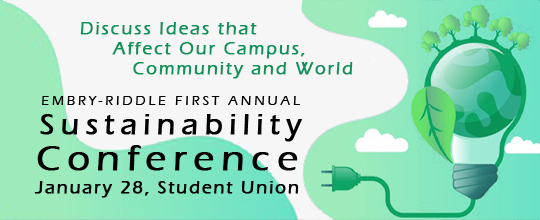
Sustainable Pedagogy
Presentation Type
Long presentation (faculty/staff) 15-20 minutes
Location
Student Union Event Center, Room 165A
Start Date
28-1-2020 12:15 PM
End Date
28-1-2020 12:30 PM
Presentation Description/Abstract
As faculty at a STEM university, each of us honor our commitment to sustainability in unique ways. While the juxtaposition of humanities and engineering may seem odd, the two fields are in fact deeply related and deeply committed to sustainable pedagogy. In this panel, each professor discusses her/his classroom space as a place of sustainable practices.
For Dr. Brown and Dr. Mitchell, their honors course series introduces students to some of the key sustainability concerns societies are facing today, the various interpretations and applications of sustainability, the role of technology in addressing sustainability issues, and the ethical principles relevant for attending to these concerns. As future engineers, scientists, resource managers, designers, and professionals, the class asks students to take seriously the development and application of technology and the need to routinely make decisions that have ethical implications for the health and welfare of others, society, and the natural environment.
In Dr. Silverman’s Environmental Communication course, students study the sustainability of our current food production system. By examining topics such as meat production, food waste, local food, and food deserts, students come to understand food is not just an issue of the physical environment but also a political, economic, and social issue that effects the sustainability of humanity as a whole. Throughout the semester, students participate in community engagement projects and learn first-hand how they can be part of the change needed and what that change looks like.
Keywords
Sustainability, Pedagogy, Humanities, Service Learning

Sustainable Pedagogy
Student Union Event Center, Room 165A
As faculty at a STEM university, each of us honor our commitment to sustainability in unique ways. While the juxtaposition of humanities and engineering may seem odd, the two fields are in fact deeply related and deeply committed to sustainable pedagogy. In this panel, each professor discusses her/his classroom space as a place of sustainable practices.
For Dr. Brown and Dr. Mitchell, their honors course series introduces students to some of the key sustainability concerns societies are facing today, the various interpretations and applications of sustainability, the role of technology in addressing sustainability issues, and the ethical principles relevant for attending to these concerns. As future engineers, scientists, resource managers, designers, and professionals, the class asks students to take seriously the development and application of technology and the need to routinely make decisions that have ethical implications for the health and welfare of others, society, and the natural environment.
In Dr. Silverman’s Environmental Communication course, students study the sustainability of our current food production system. By examining topics such as meat production, food waste, local food, and food deserts, students come to understand food is not just an issue of the physical environment but also a political, economic, and social issue that effects the sustainability of humanity as a whole. Throughout the semester, students participate in community engagement projects and learn first-hand how they can be part of the change needed and what that change looks like.

Comments
Sustainable Pedagogy by Taylor Mitchell, Jeff Brown,